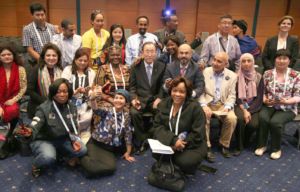News
Somali Diaspora mobilising in wake of World Humanitarian Summit
This article is more than 9 years old.

Ban Ki-moon had his ear (and feet) to the ground in Istanbul
18 years ago Abdulkadir Ga’al fled the horrors of civil war in Somalia and ended up in Denmark.
Since then, he has built a career as an employment advisor at the Copenhagen Municipality and he has been elected three times to the advisory board of the Danish Refugee Council’s Diaspora Program.
“Somalia is in need of emergency humanitarian assistance, health care, food security, water and sanitation,” Ga’al told CPH Post Weekly.
“In March, the drought exacerbated by El-Nino hit Somalia with force and Somali Diaspora mobilised in order to organise fundraising events and send money and remittances to the people affected in those areas.”
Invaluable commitment
According to the World Bank, in 2015 remittances were estimated to reach a total of 9.25 billion kroner in Somalia and support 23 percent of the nation’s GDP. These numbers give a clear glimpse of the massive aid and effectiveness provided by Somali Diaspora.
Ga’al’s commitment towards his home country has recently been facilitated by the DEMAC project. In May, he was been selected, along with four other members of the Somali Diaspora in Denmark, to represent the DEMAC Diaspora Delegation at the first World Humanitarian Summit (WHS) in Istanbul, Turkey.
The two-day summit had an agenda for five core areas of humanity: prevent and end conflict, respect rules of war, leave no one behind, working differently to end need and invest in humanity.
Banter with Ban
During the first day, Ga’al had the opportunity to interact with the Secretary-General of the United Nations, Ban Ki-moon.
Pointing out the goal of leaving no one behind, Ga’al conveyed his concern to Ban Ki-moon about the Kenyan government’s plan to close the Dadaab refugee camp, which hosts around 350,000 people. Ga’al stressed that Somalia doesn’t have the capacity to receive refugees back home as the country doesn’t have the resources to relocate the people.
“Ban Ki-moon understood the issue, while he highlighted the Kenyan government’s security concern. Being such a populated camp, it could be infiltrated by the terrorist group, Al-Shabaab,” said Ga’al.
Unique local insight
Ki-moon pledged to speak with the president of Somalia and the deputy president of Kenya about Ga’al’s concerns.
Moreover, while speaking with Peter de Clercq, the deputy head of the UN’s Assistance Mission in Somalia (UNSOM), Ga’al underlined the need for international humanitarian actors to recognise the Diaspora’s engagements in humanitarian aid as complementary actors, not as competitors.
“We have geographical knowledge, we speak the local language, we have access to local community partners, we have relevant and timely information and we are able to provide direct support.” said Ga’al.
Consolidating forces
During the summit, the Diaspora delegates gave speeches at the plenary sessions and interacted with several representatives of NGOs, civil society, conventional humanitarian actors and world leaders.
Ga’al realised that the first step needed is to co-ordinate all the various organisations representing diaspora in Denmark and linking up with other diaspora groups from post-conflict nations, like Sierra Leone.
“It is very important to have one strong voice and establish a platform in order to push ahead and be recognised as official partners and influencers in the humanitarian and development arena,” he said.










































